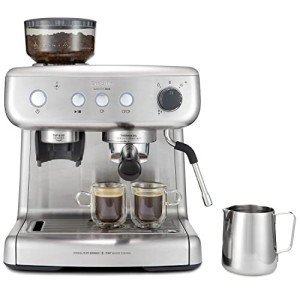Home Use Espresso Machines It's Not As Expensive As You Think
Home Use Espresso Machines: A Comprehensive Guide
Espresso machines have actually become a staple in lots of households as coffee lovers look for to replicate café-quality brews in the comfort of their kitchen areas. The rise in appeal has actually resulted in a varied market filled with different designs, features, and costs. This post intends to supply a useful overview of home use espresso machines, assisting readers navigate their alternatives efficiently.
Understanding Espresso Machines
Espresso machines work by forcing hot water through finely-ground coffee under high pressure, leading to a focused coffee beverage known as espresso. There are Dual Boiler Espresso Machines of espresso machines categorized based on their brewing approaches and level of automation. The most typical types include:
Manual Espresso Machines: These require the user to manage the pressure and water flow, enabling a more hands-on coffee-making experience.
Semi-Automatic Espresso Machines: These offer automatic control over water pressure, while the user by hand grinds and tamps the coffee.
Automatic Espresso Machines: With the push of a button, these machines instantly manage the flow of water, making it easier to brew espresso with constant outcomes.
Super-Automatic Espresso Machines: These all-in-one machines deal with grinding, tampering, brewing, and even milk frothing, making them perfect for users looking for convenience.
Pill or Pod Machines: These use pre-packaged coffee pods to develop espresso with minimal effort, but they limit option in developing techniques and flavors.
Table: Comparison of Espresso Machine Types
Type
Control Level
Relieve of Use
Cleaning Level
Suitable For
Manual
User-controlled
Moderate
High
Coffee perfectionists
Semi-Automatic
Partial automation
Moderate
Moderate
Home baristas
Automatic
Completely automated
Easy
Low
Busy people
Super-Automatic
Completely automated
Very easy
Extremely low
Convenience seekers
Capsule/Pod
Completely automated
Very simple
Extremely low
Casual drinkers
Key Features to Consider
When choosing a home use espresso machine, it's important to think about different features that can considerably impact the quality of espresso and user experience.
Pressure: Look for machines that provide at least 9 bars of pressure, as this is considered optimal for developing espresso.
Boiler Systems: Single vs. dual boiler systems identify temperature level stability and the capability to brew espresso and steam milk concurrently.
Grinder: Integrated mills permit newly ground coffee, which improves flavor. Consider machines with adjustable grind settings.
Milk Frother: For those who enjoy coffees and lattes, a built-in steam wand or automatic frother is vital.
Size and Design: Consider your cooking area area and visual preferences. Machines are available in various sizes, from compact to big setups.
Price: Home espresso machines can vary from a few hundred to several thousand dollars, so it's vital to establish a budget before checking out alternatives.
Benefits and drawbacks of Home Use Espresso Machines
Pros
Cons
Convenience of brewing coffee at home
Initial investment can be high
Quality of espresso is frequently exceptional
Requires some skill, particularly with manual machines
Ability to try out flavors
Upkeep and cleaning can be labor-intensive
Can save cash in the long run
Not all machines will fit every coffee preference
Upkeep and Cleaning Tips
Keeping an espresso machine is essential for lengthening its life and making sure consistent brew quality. Here are some useful tips:
Regular Descaling: Minerals from water can build up in the machine. Descale every 1-3 months, depending upon water hardness.
Daily Cleaning: Rinse portafilters, baskets, and steam wands after each use to avoid coffee oils from building residue.
Use Filtered Water: This can help lower mineral buildup and improve the taste of coffee.
Change Gaskets and Seals: These elements might wear in time and should be replaced to preserve pressure and efficiency.
Read the Manual: Each machine has particular care instructions; following these will make sure durability.
FAQs About Home Use Espresso Machines
**Q1: What is the very best budget espresso machine?The best budget espresso machine typically depends on individual needs, but designs like the DeLonghi EC155 or the Breville Bambino are popular amongst users for providing fantastic worth. Q2: How long do home espresso machines generally last?With proper upkeep, home espresso machines can last anywhere from 5 to 15 years, depending on the quality of the machine and frequency of use. Q3: Can I make cappuccinos and lattes with any espresso machine?While most espresso machines can make cappuccinos and lattes, having a trusted
steam wand or frother is vital for accomplishing the right milk texture.
Q4: Are super-automatic machines worth the investment?For those who focus on convenience and quick developing, super-automatic machines can be worth the investment, though they may lack some customizability in brew strength and taste. Q5: What types of coffee beans are best for espresso?While individual choice plays a role, beans labeled as” espresso “blends are usually roasted darker, creating abundant tastes and a creamy texture when brewed.
Purchasing a home espresso machine can transform the everyday coffee regimen into something unique, elevating home brews to café quality. By understanding the different types of machines, essential functions to think about, upkeep needs, and weighing the
advantages and disadvantages, customers can make informed decisions that fit their specific preferences. As the espresso culture continues to grow, no matter the choice, every brew can be a delicious experience waiting to be appreciated.  **
**